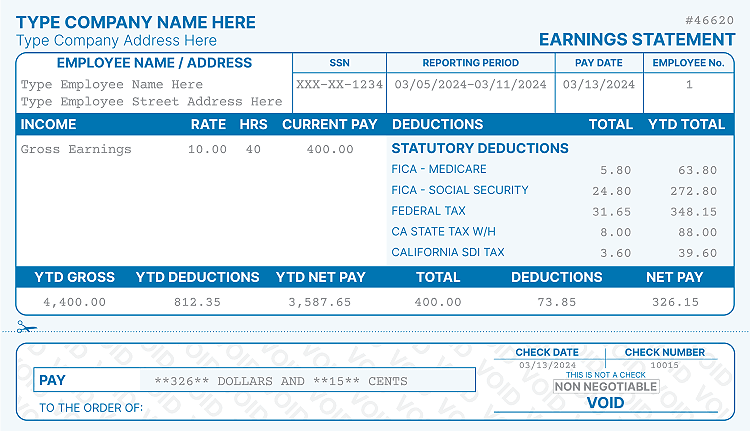Do Employers Have to Provide Pay Stubs as Proof of Income
A pay stub can come in handy in so many situations. Whether you’re applying for a bank loan or looking for a new home, you’ll probably be asked to produce some official proof of income.
You may think that a pay stub is a document you’ll always be capable of getting but this isn’t necessarily the case. Legal requirements vary from one state to another. In some part of the US, employers have no legal obligation to hand out paycheck stubs to employees.
So, what exactly can you count on when needing proof of income and is there an alternative to the pay stub? Is your employer obliged to issue some kind of official document that certifies the money you’ve earned for a certain period of time? Let’s go through the details to address these important questions.
Does My Employer Have to Give Me a Pay Stub?
The short answer to this question depends on your location.
On a federal level, there isn’t a pay stub issuing requirement. The one law concerned with wages is the Fair Labor Standards Act (FLSA) and it doesn’t have such a provision.
State Legal Requirements for Pay Stub Issuing
In terms of state requirements, there are states that have no pay stub laws, states that ask employers to provide access to paystubs and states in which pay stubs have to be printed out and given to employees rather than provided electronically.
The states that don’t have pay stub issuing requirements include:
- Alabama
- Arkansas
- Florida
- Georgia
- Louisiana
- Mississippi
- Ohio
- South Dakota
- Tennessee
The states in which pay stub provision is mandated by law include:
- Alaska
- Arizona
- Idaho
- Illinois
- Indiana
- Kansas
- Kentucky
- Maryland
- Michigan
- Missouri
- Montana
- Nebraska
- Nevada
- New Hampshire
- North Dakota
- New Jersey
- New York
- Oklahoma
- Pennsylvania
- Rhode Island
- South Carolina
- Utah
- Virginia
- West Virginia
- Wisconsin
- Wyoming
And here are the parts of the US where employers have to print and hand out pay stubs for each pay period:
- California
- Colorado
- Connecticut
- Iowa
- Maine
- Massachusetts
- New Mexico
- North Carolina
- Texas
- Vermont
- Washington
Can I Ask for One?
So, you’re now probably wondering about getting a pay stub in the event of your employer not being required to give you one.
You can most definitely ask for a pay stub.
Whether an employer obliges with your request is something else.
In the states that don’t mandate pay stub issuing, an employer has all legal rights to turn down your request. That situation will leave you seeking alternatives.
Note: While it’s possible to create your own pay stub online (there are lots of free platforms you can use for the purpose), this isn’t the best approach. A pay stub carries no legal weight if it doesn’t come from your place of employment. Self-made paystubs are fairly easy to falsify. Thus, banks and other institutions will probably ask for additional proof of income in order to verify your claims.
What’s the Pay Stub Request Procedure
If you don’t get access to a pay stub for every sum you receive, you’ll need to request one. It’s a good idea to inform yourself about the procedure that the particular enterprise and department follow.
In most cases, you’ll need to go through a few simple steps in order to request a pay stub:
- Get in touch with the HR or the payroll department
- Let them know what they need and inquire about the procedure
- In some instances, just asking for a pay stub is going to be enough
- Some companies may have you submitting a written request
- If employee payment information is kept in an online database, you may have to ask for access (in case you don’t want a printed copy)
When Do Private Employers Have to Provide Pay Stubs?
Private employers have to provide a pay stub in only one situation – when they have a legal obligation to do so.
If a state doesn’t have laws on the topic, an employer may decide to produce a pay stub as a form of good will gesture. There is no way to demand one or threaten legal action if you don’t receive the document that you need.
Online Solutions for Pay Stub Creation
In some situations, you’ll be given access to online solutions that allow you to view or print your pay stubs. Below, we’ve listed a few examples of such and the ways in which you can get your pay stubs.
Getting Pay Stubs from the ADP App
If you have access to the ADP portal, you’ll need to do a few things in order to access your pay statements there:
- Access the portal (via login.adp.com), enter your user ID and password (if you don’t have access, you’ll need to ask your employer for it)
- Go to Pay Statements Summary page
- From there, you’ll get to choose the pay period that you’ll need to get a statement for
- Your statement will most probably appear in PDF format (depending on the settings that the company has chosen)
- Once you have access to the file, you can print it or save it on your computer
Getting Pay Stubs from Amazon
Amazon Pay can also be used to access, download or print your statements. The procedure is once again fairly simple:
- The easiest way to access this information is once again through ADP (as long as your employer has enabled this possibility)
- Go to the ADP Employee Portal and enter your Amazon registration code (it changes regularly for security reasons, which is something to keep in mind)
- You’ll need to provide your Amazon ID and account info in order to receive the statements and save or print them
If you’d like to go directly through Amazon Pay, you can find the details on accessing your statements here.
Getting Pay Stubs from Quickbooks Online
To print or download paystubs via Quickbooks Online, you’ll need to complete the following steps:
- Set up your Workforce account
- When you’re done with the registration, sign in to workforce.intuit.com
- Select Paychecks from the menu
- Choose the date range for the pay period you’re interested in
- When you have access to the pay stub, you should either choose the download or the print option
Employer Asking for Pay Stub Will Need to Follow the Same Procedure
The details listed above are for employees to count on but employers who utilize these platforms will more or less have to go through the same steps in order to access pay stub information. While there are different interfaces for employers and employees, the databases are typically accessed in one and the same way.
What Can I Use Instead of a Pay Stub?
So, what happens if you don’t get a pay stub? Should you just give up on an opportunity because your employer has refused to cooperate? Not so fast!
There are alternative opportunities and we’re not talking about creating your own pay stub.
The easiest way to verify your income involves the provision of a W-2 Wage and Tax Statement.
Form W-2 is a document is a document that an employer is legally required to send to both employees and the Internal Revenue Service (IRS). As the name suggests, the document contains data about your income and about taxes that have been paid over the course of the fiscal year.
The W-2 is an annual document and it is universal. This means there are no variations from one employer to another. As such, the W-2 is considered the most standardized option that people can count on to deliver proof of income.
You don’t have to ask for your W-2 form, your employer has a legal obligation to give it to you (if you’re eligible to receive this document). Usually, the W-2 is handed out in late January or early February following the tax year that’s ended.
Even if you lose your W-2 form, you can request a copy from your employer. They can’t turn this request down.
Proof of Income: Best Ways to Provide It
Apart from using your W-2 form, you can count on a couple of additional opportunities to produce valid proof of income.
Bank Statements
A bank statement is another valid, reliable document you can provide to give a certain entity information about your income.
Most people get their salary via a wire transfer every single month. This means that the bank has sufficient proof of regular incoming sums from one and the same employer.
People who have saved up some money will also benefit from a bank statement. In that instance, the document will show the availability of some additional funds – something that may come in handy in numerous situations.
Officially Signed Offer Letter
This is a good choice for the people who are starting a new job.
If you’re in the process of changing employment, providing actual proof of income can be difficult.
Many institutions will be ok with an offer letter that contains income information and that has been signed by the new employer.
The offer letter gives the “promise” of income. While it’s not proof per se, very often this document is going to be accepted.
Profit or Loss Statements
Self-employed individuals and those who own a small business can provide profit or loss statements instead of pay check stubs.
As you can see, proof of income isn’t that difficult to obtain, even if your employer turns down a pay stub issuing request. US laws still oblige companies to provide their employees with official documents that verify income and taxes paid over the course of the fiscal year. Knowing that you’re entitled to such information will help you protect your rights and spot eventual violations that aim to deprive you from access to vital financial data.
Kristen Larson is a payroll specialist with over 10 years of experience in the field. She received her Bachelor's degree in Business Administration from the University of Minnesota. Kristen has dedicated her career to helping organizations effectively manage their payroll processes with Real Check Stubs.

